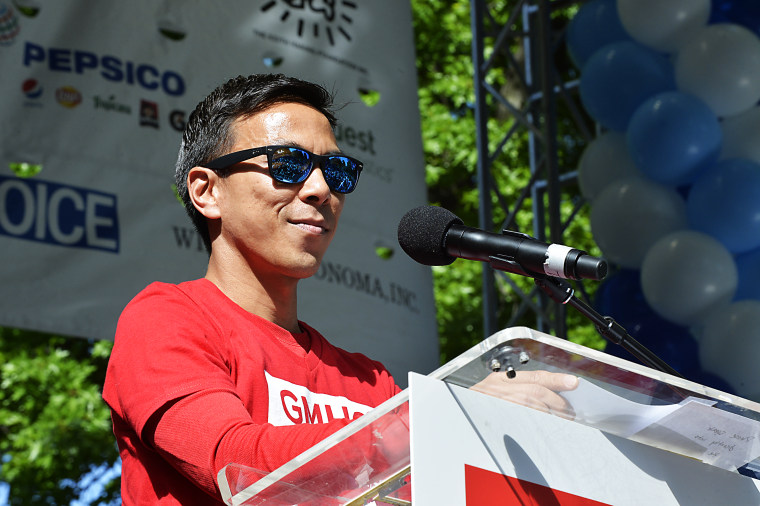Armed with a determination to help people and find a more rigorous way to manage a nonprofit, Kelsey Louie has been leading 36-year-old HIV services organization GMHC (formerly the Gay Men’s Health Crisis) as its CEO since 2014.
Louie spoke with NBC News for NBC Out’s #Pride30 special about what drew him to nonprofit work, misconceptions about HIV and GMHC’s iconic co-founder Larry Kramer.
HOW DID YOU FIND YOURSELF AT THE HELM OF GMHC?
“When I was much younger I wanted to become a doctor, and as I was going through my studies in college, I realized there were many more ways to help people, and then I realized social work was what I really wanted to do because of the types of people I wanted to work with. In particular, people that are marginalized
“Then I wanted to work with the LGBTQ community, which is why I got the job at GMHC in 2006. I missed working with children, so I went back to the child welfare world when I was recruited to working at a place called Harlem United Community AIDS Center, which is where I spent 7 years of my career. During this time was when I realized that I really want to become an effective nonprofit manager, and I realized that there are many things in nonprofit management that I didn’t feel were as rigorous as they should be, so I decided to get my MBA.
“When a recruiter for GMHC approached me, I did not really want the job. I just knew it would be a lot of responsibility to run the world’s first AIDS service organization, but in a moment of courage I thought that I could do it, and that I could potentially be the one to turn GMHC around. I thought that New York City, the LGBTQ community and the HIV community deserved a revitalized GMHC. That was 4 years ago.”
COMPARED YOUR EXPECTATIONS, WHAT HAS THE ACTUAL JOB -- LEADING ONE OF THE WORLD’S MOST PROMINENT HIV ORGANIZATIONS -- BEEN LIKE?
“I knew it was going to hard, and it has been hard. It’s been harder than I thought, but it’s been equally rewarding. Right before I started I went to the world premiere of the HBO movie “The Normal Heart,” which is about the early days of HIV and includes the beginning of GMHC. In the 15 seconds after the credits started to roll, I felt the tremendous weight on my shoulders, and I didn’t expect that.
That has been a responsibility that I carry that makes this job much more serious than other jobs I might have taken. I do take the responsibility of the thousands of people that GMHC impacts, and has impacted over its history, very seriously.”
YOU BROUGHT ICONIC LGBTQ ACTIVIST AND GMHC CO-FOUNDER LARRY KRAMER BACK INTO THE FOLD. TELL US ABOUT THAT.
“It was a scary process at first. It was something that I felt needed to happen. One of the things GMHC has been plagued with is conflict and relationships that were severed. I thought GMHC reconciling with Larry Kramer would be really important for lots of reasons. I thought it would be healing for him. I thought it would be healing for the organization. But most importantly, or equally importantly, I thought it would be healing for the entire community.
“I think a lot of people like a good fight, but more people like a good reconciliation. I just thought it was important to have our founder support the work that we’ve been doing, and I wanted to make sure I was running an organization that fit in his vision. Or at least to have that conversation about where we were today and what his vision was. When we say things like, ‘We stand on the shoulders of giants,’ he is one of those giants, and I wanted to do what I could to make that reconciliation happen.”
WHAT IS THE BIGGEST MISCONCEPTION ABOUT HIV TODAY?
“Probably the biggest misconception is that AIDS is not a problem. We still have about 40,000 new HIV infections across the country a year. What has changed is who is getting infected more. While rates of infections are going down in some populations, they are raising in others. At least in New York State the rate for women has gone up, in particular woman of color, in particular trans women of color.”
WHAT DOES “PRIDE” MEAN TO YOU?
“Pride means so many things. One thing that it means is that it’s an opportunity to remind ourselves of the tenacity, resilience, passion and smarts of other people in our community. We take for example Emma Gonzalez, who spoke out against gun violence after the Parkland high school shooting. It is important for us to recognize that and to honor that type of courage and leadership. I think pride is a good time to remind ourselves that it is important to be out and open about who we are. We all can contribute to a more humane society regardless of our differences.”
View the full NBC Out #Pride30 list & follow NBC Out on Twitter/Facebook/Instagram
